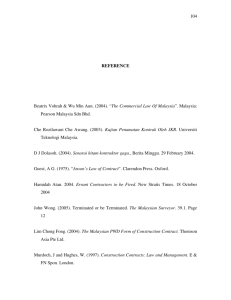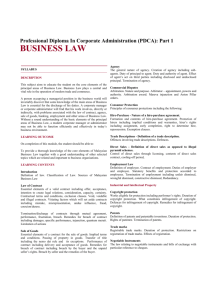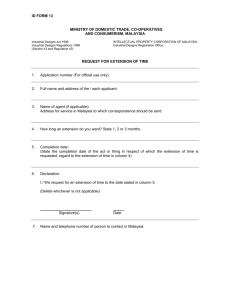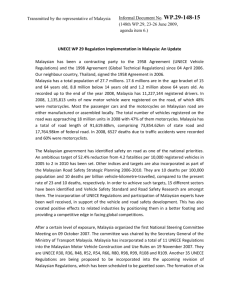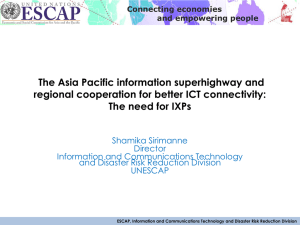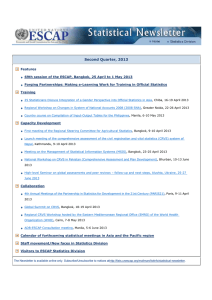opening speech
advertisement
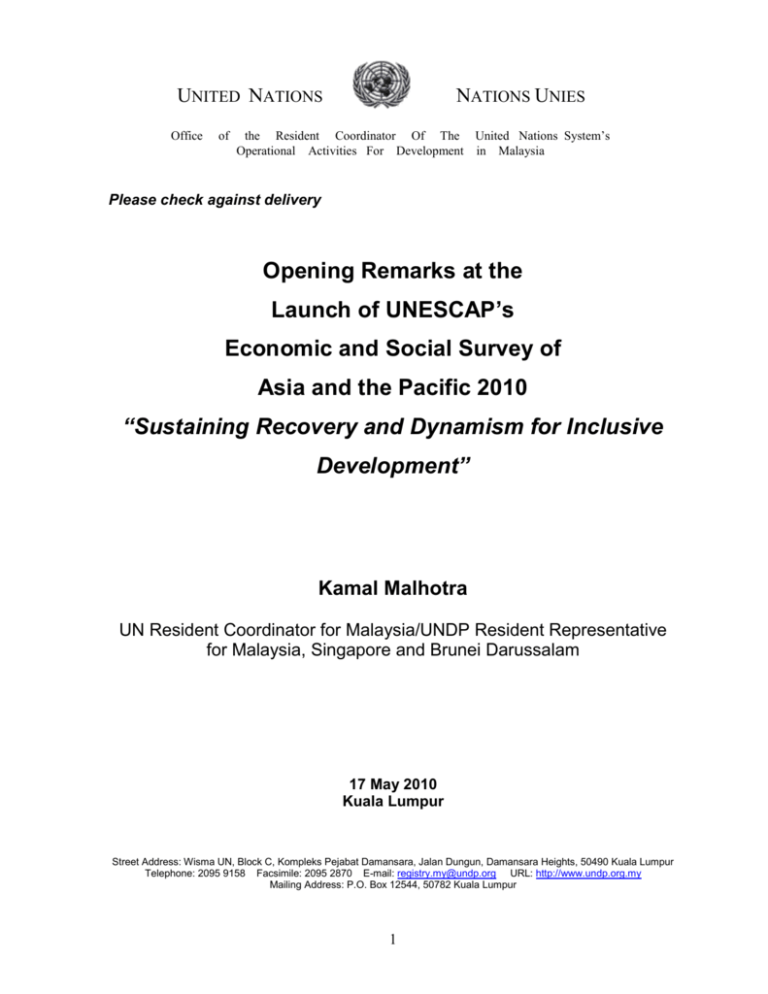
UNITED NATIONS Office of NATIONS UNIES the Resident Coordinator Of The United Nations System’s Operational Activities For Development in Malaysia Please check against delivery Opening Remarks at the Launch of UNESCAP’s Economic and Social Survey of Asia and the Pacific 2010 “Sustaining Recovery and Dynamism for Inclusive Development” Kamal Malhotra UN Resident Coordinator for Malaysia/UNDP Resident Representative for Malaysia, Singapore and Brunei Darussalam 17 May 2010 Kuala Lumpur Street Address: Wisma UN, Block C, Kompleks Pejabat Damansara, Jalan Dungun, Damansara Heights, 50490 Kuala Lumpur Telephone: 2095 9158 Facsimile: 2095 2870 E-mail: registry.my@undp.org URL: http://www.undp.org.my Mailing Address: P.O. Box 12544, 50782 Kuala Lumpur 1 Yang Berbahagia Emeritus Professor Datuk Dr Mohamed Ariff, Distinguished Fellow, Malaysian Institute of Economic Research; Ms. Nobuko Kajiura, United Nations Economic and Social Commission for Asia and the Pacific; Dr Shankaran Nambiar, Head, Policy Studies Division, Malaysian Institute of Economic Research; Distinguished Guests; Members of the Media; Ladies and Gentlemen; A very good morning to all of you. On behalf of the United Nations Country Team in Malaysia, it is my great pleasure to welcome all of you to Wisma UN for the launch of the 2010 UNESCAP Economic and Social Survey of Asia and the Pacific. I am especially grateful for the presence of Ms. Nobuko Kajiura of UNESCAP who has flown in from Bangkok to enlighten us on the main findings of the survey; as well as to Emeritus Professor Datuk Dr Mohamed Ariff and Dr. Shankaran Nambiar for agreeing to discuss the results of the survey in the Malaysian context. 2 As you are aware, ESCAP’s annual survey analyses trends in the regional economy against the background of global developments. It outlines the most critical issues, challenges and risks our region faces. This year’s theme, “sustaining recovery and dynamism for inclusive growth”, is most opportune as it addresses the concerns and complex policy decisions facing the region as it strives to turn the current economic rebound into a sustained recovery to support a more dynamic and inclusive growth trajectory in the short- to long-term. Both Asia’s strengths and resilience as well as its weaknesses as an emerging global economic player have become clearer to many of us and the world at large during the recent episode of the global financial and economic turmoil which threatened the very core foundations of the financial system in the developed world. While it is undeniably true that Asia did suffer adversely from the spill over effects of the crisis through a reduction in exports to the developed world and its associated multiplier effects, the overall implications for growth in Asia were relatively less severe compared to other regions. At the height of the crisis, Asia as a whole was still growing at 0.4%. The strong financial systems and strengthened macroeconomic fundamentals that formed the backbone of Asia’s rapid economic transformation post the 1997/1998 Asian financial crisis, had to a large extent cushioned the effects of the current crisis. Looking forward, it is projected that Asia will grow by 7.0% on average in 2010 - with a large part of this growth being attributed to China, which is anticipated to grow by 9.6% and India at 8.3%. This high annual projected growth places Asia in a unique and advantageous position to 3 lead the global economic recovery process in the months to come. Asia must take advantage of this position to drive recovery in the most responsible and effective manner – this would entail a growth model which involves less environmental destruction, avoids over-exploitation of natural resources and most importantly, significantly mitigates the excesses in risk-taking and consumption which resulted in a misaligned incentive system which led to the 2008-09 global and regional financial and economic crisis. Since over 950 million people subsist under the USD1.25 per day poverty line in Asia, the continent has an urgent and enormous global responsibility to ensure a future growth trajectory which is equitable and fair and one through which the growing disparities between the urban and rural sectors are reduced and the welfare of all people are equally prioritized. Such equitable development, according to the ESCAP survey, can be achieved, through economic expansion driven by new sources of growth from within the region. These new and more environmentally friendly sources of growth, the survey argues, will augment aggregate demand and supply, leading, in the long-run, to environmentally sustainable development and standards of living that are more inclusive. The survey also highlights the need to boost domestic and foreign investment in Malaysia, which, in recent years, has witnessed a significant downward trend. The recent announcement of the New Economic Model in Malaysia also addresses these issues, amongst others, as part of urgent efforts to propel the Malaysian economy to high value added status by 4 the year 2020. The New Economic Model’s focus on the three principles of high income, sustainability and inclusiveness, resonates well with the recommendations of the 2010 ESCAP survey. Ladies and Gentlemen, Asia’s leadership in lifting the global economy out of its current limbo, hinges to a large extent on its ability and willingness to leave behind its old export-led growth model which resulted in unsustainable global imbalances. This growth model provided the environment for developing Asia to subsidise the West through exports of cheaper goods and services and through net capital flows from developing countries to the US in particular. To make this kind of export model work, wages needed to be kept low, leading to rising inequality. Although most Asian countries had recorded significant drops in levels of poverty in the decades preceding the crisis, it is important to note that growth would have had an even bigger impact on poverty reduction if it had not been associated with rapidly increasing inequality. It is against this backdrop that the ESCAP survey convincingly argues that Asia will not be able to return to ‘business as usual’ and will have to address its macroeconomic, developmental and ecological imbalances if the countries in the region are to have an opportunity to create new motors of inclusive growth that will help them regain their economic dynamism. A similar thread of argument which calls for Asia to rebalance its growth strategy from the current dependence of much of the region on export-led growth to a regional and domestic demand led expansion, can also be found in two recent UNDP publications in this 5 region - Regional Synthesis Report on the Global Financial Crisis and the Global Financial Crisis and the Malaysian Economy: Impact and Responses – copies of which have been made available for all of you at the registration table. Ladies and Gentlemen, While we must embrace change if we desire a better future, we must always remind ourselves and the governments that serve us that economic development is not solely about numbers or about trade, finance and wealth creation - economic development is about the welfare of people, the enhancement of which requires economic growth as only one of many means. It is the UN’s hope that the ESCAP survey being launched today will contribute to an increased appreciation and understanding of the complexities of the Asian economies and their future role in ensuring a more dynamic, sustainable, and equitable growth trajectory that supports more inclusive human development. To present the main messages of the survey and elaborate further on its findings, it now gives me great pleasure to call upon Ms. Nobuko Kajiura of ESCAP to present the 2010 Economic and Social Survey for Asia and the Pacific. Thank you. 6

